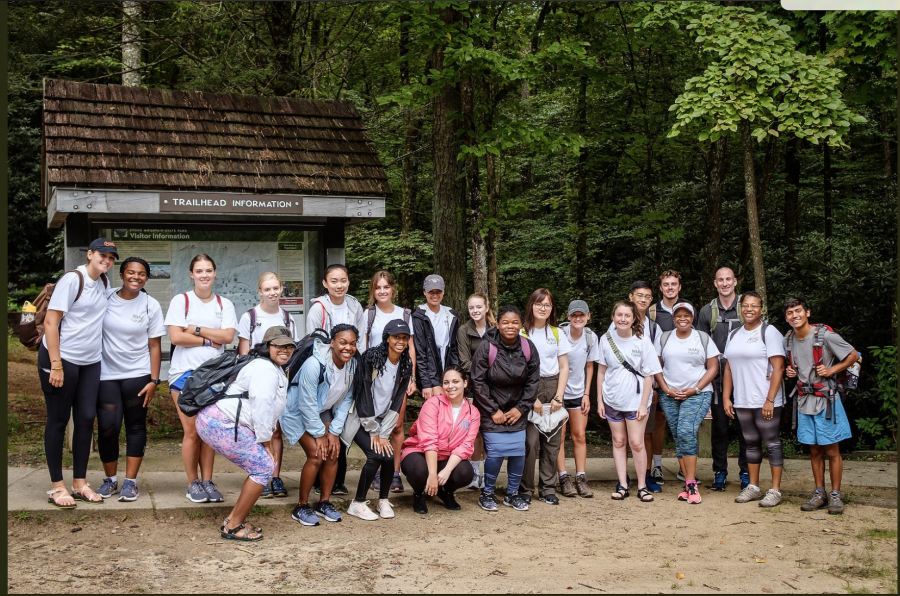During this year’s pre-orientation activities, while much of the Class of 2022 was adventuring outdoors, volunteering in the Winston-Salem community and learning about the history of Wake Forest, a group of fourteen incoming freshman spent four days days exploring every dimension of personal wellbeing in the university’s first-ever WakeWell pre-orientation program. The program was co-led by Dr. Denisha Champion and Dr. Malika Roman Isler.
According to Isler, the Director of Wellbeing at Wake Forest, WakeWell was added to the selection of pre-orientation programs as part of Thrive, the university’s comprehensive commitment to overall student wellness. Therefore, participants engaged in activities and discussions surrounding the eight components of wellbeing emphasized by Thrive: emotional, environmental, financial, intellectual, occupational, physical, social and spiritual.
“As an community, we embrace eight dimensions of wellbeing and encourage all Deacs to show up fully and explore the full range of who they are,” said Roman Isler. “Part of our goal with WakeWell is to set the stage for the newest members of our community to better understand how each dimension of wellbeing is essential to a purposeful and meaningful life, create space for self-reflection around each of those areas and provide tools and skills that students can apply over the next four years and beyond.”
Activities at WakeWell covered two of the eight dimensions of wellbeing each day. “For each dimension, we provided a highly engaging and interactive session that focused on increasing self-awareness, practical application, and community-building,” Isler said. “Many of the sessions included campus and local resources, experts, and experiential opportunities.”
For example, on the day dedicated to physical and environmental wellbeing, activities included a day hike to Stone Mountain Park, reflective time at a waterfall, a natural grounding exercise and discussions about the benefits of natural spaces. “My body nearly gave out,” said freshman Cat Walwer. “To be honest, it did give out as soon as I got to the dorm. But being able to say that I climbed a mountain with the first ever WakeWell group meant something to me. I take immense pride that I was able to share the experience with others.”
In addition, freshman Renate Ma said that several of the activities emphasizing non-physical health also helped her develop skills and acquire tools necessary for a successful transition to college life. “It helped me develop holistically as a person,” she said. “[The social wellbeing activities] taught me so many social cues that I was struggling with, like being vulnerable to people, and what a healthy relationship is like along with what to look out for. I learned about the dangers of numbing ourselves from pain, because that can also numb our senses of happiness and joy.”
Students also received “emotional first aid kits,” for which they were allowed to select yo-yos, journals, coloring books and Play-Doh. For occupational wellbeing, students visited the Office of Personal & Career Development and discussed the skills they already possessed that could be transferred to a workplace, and for financial wellbeing, they learned how to make a budget and avoid overspending. Ma also emphasized the helpfulness of the time spent on spiritual wellbeing. “I have explored my core value of beliefs, and I made a hundred-word philosophy for myself,” she said. “Through our discussion, I was able to increase my self-worth and my unique identity.”
Both Ma and Walwer said that WakeWell familiarized them with on-campus resources, helped them find tools to cope with stress and helped them start to find friendships. “I was able to connect closely with the fellow freshmen in the group and with the upperclass peer leaders,” Walwer said. “It made things go smoothly, and now I have strong connections that have made a lasting impact on my college career.”
Ma concurred that the program provided her with critical resources in her own college transition. “I was not too worried about making new friends because I knew I was going to meet people I liked sooner or later, and I knew I already had friends in this new environment,” she said. “The confidence I received from this experience has helped me to stick to my true identity, establish a good sleep schedule, realize the importance of self-care and [know] that it’s not selfish to care for myself and have the courage to say no. I didn’t have to go to parties or events I didn’t want to go to, because I stuck to my values … Finally, I learned to be patient and kind with myself, something I certainly will need through my years in college and life beyond.”














